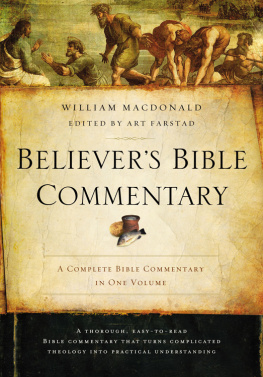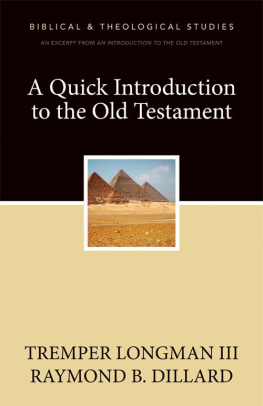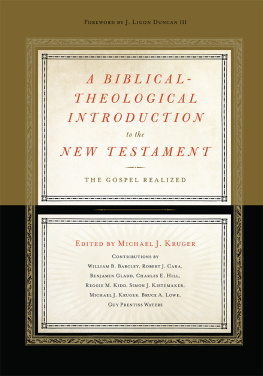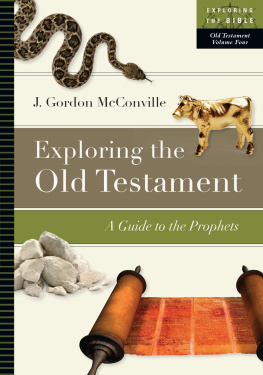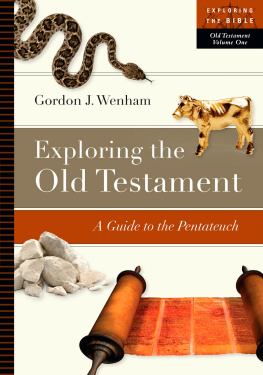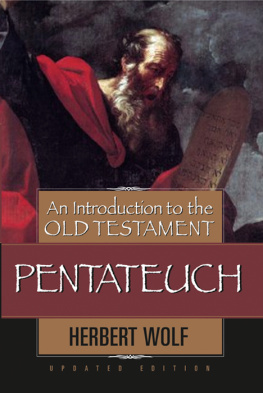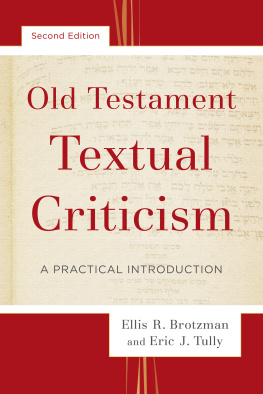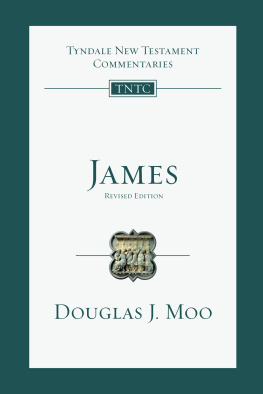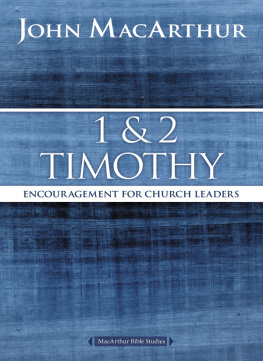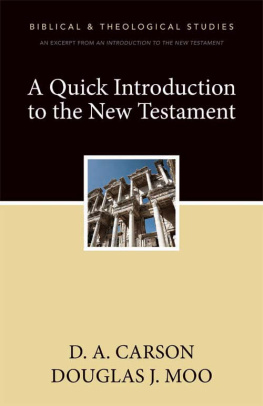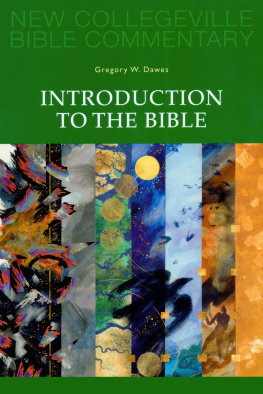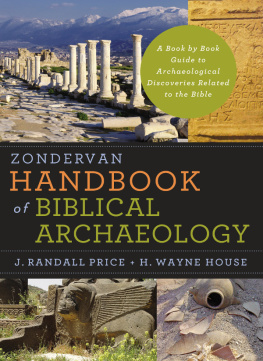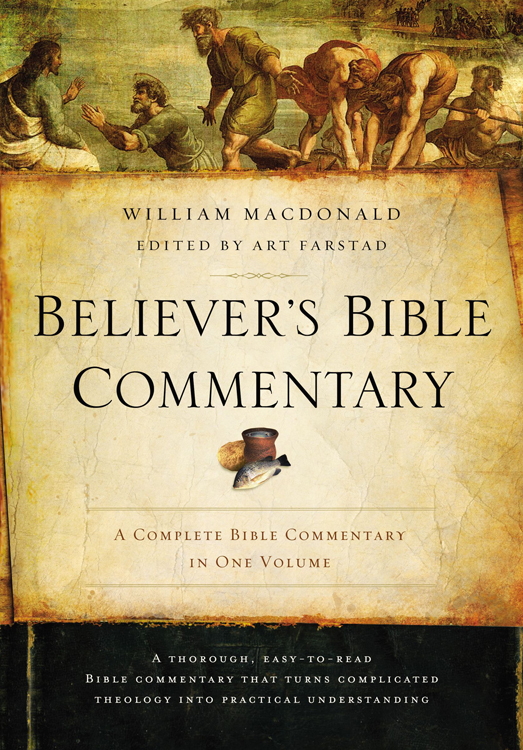
B ELIEVERS B IBLE C OMMENTARY
WILLIAM MACDONALD
EDITED BY ART FARSTAD

Copyright 1989, 1990, 1992, 1995, 2016 by William MacDonald
All rights reserved. No portion of this book may be reproduced, stored in a retrieval system, or transmitted in any form or by any meanselectronic, mechanical, photocopy, recording, scanning, or otherexcept for brief quotations in critical reviews or articles, without the prior written permission of the publisher.
Published in Nashville, Tennessee, by Thomas Nelson. Thomas Nelson is a registered trademark of HarperCollins Christian Publishing.
Some of the charts are taken from Nelsons Complete Book of Bible Maps and Charts, Third Edition, copyright 1993, 1996 by Thomas Nelson,
Some of the materials in this volume were previously published by Emmaus Bible College, Loizeaux Brothers, Harold Shaw Publishers, and are used with their permission. However, they have been revised, expanded, and considerably edited.
Permission has been granted to the author and is gratefully acknowledged for quotation from the following copyrighted works: From Id Rather Have Jesus, by George Beverly Shea. Copyright 1922, 1939 by the Rodeheaver Co. (a division of Word, Inc.). All rights reserved. Used by permission. From I Stayed Too Long at the Fair, by Billy Barnes. Copyright 1957, Tylerson Music Co. Used by permission.
Thomas Nelson titles may be purchased in bulk for educational, business, fund-raising, or sales promotional use. For information, please e-mail SpecialMarkets@ThomasNelson.com.
This commentary is based on the New King James Version. 1982 by Thomas Nelson. Used by permission. All rights reserved.
Scripture quotations marked (Amplified Bible) or The Amplified New Testament are taken from The Amplified Bible, Old Testament copyright 1965, 1987 by the Zondervan Corporation and The Amplified New Testament copyright 1958, 1987 by The Lockman Foundation. Used by Permission. All rights reserved.
Scripture quotations marked (TLB) are taken from The Living Bible copyright 1971. Used by permission of Tyndale House Publishers, Inc., Carol Stream, Illinois 60188. All rights reserved.
Scripture quotations taken from the New American Standard Bible copyright 1960, 1962, 1963, 1968, 1971, 1972, 1973, 1975, 1977, 1995 by The Lockman Foundation. Used by permission.
Scripture quotations marked (FWG) or (TEV) are taken from Good News Translation, copyright 1992 American Bible Society. Used by permission. All rights reserved.
Scripture quotations marked (NEB) are taken from the New English Bible, copyright Cambridge University Press and Oxford University Press 1961, 1970. All rights reserved.
Scripture quotations marked (KJV) are taken from the King James Version, copyright 1987 Thomas Nelson. All rights reserved.
Scripture quotations marked (JBP) are taken from The New Testament in Modern English by J.B Philips, copyright 1960, 1972 J. B. Phillips. Administered by The Archbishops Council of the Church of England. Used by Permission.
Scripture quotations marked (RSV) are taken from the Revised Standard Version, copyright 1952 [2nd edition, 1971] by the Division of Christian Education of the National Council of the Churches of Christ in the United States of America. Used by permission. All rights reserved.
Scripture quotations marked (Knox) are taken from The Holy Bible: A Translation From the Latin Vulgate in the Light of the Hebrew and Greek Originals, copyright 1936, 1945 Baronius Press. Used by permission. All rights reserved.
ISBN: 9780718076856
ePub Edition July 2016: 978-0-718-09155-2
CONTENTS
The purpose of the Believers Bible Commentary (BBC) is to give the average Christian reader a basic knowledge of what the Holy Bible is all about.
The BBC is also intended to stimulate such a love and taste for the Bible that the believer will want to delve more deeply into their inexhaustible treasures. While scholars will hopefully find food for their souls, they will be considerate in understanding that the book was not designed primarily for them.
All books have been supplied with introductions, notes, and bibliographies.
With the exception of Psalms, Proverbs, and Ecclesiastes, the exposition of the Old Testament is generally presented in paragraph-by-paragraph rather than in verse-by-verse form. The comments on the text are augmented by practical applications of spiritual truths and by a study of typology, where appropriate.
Passages that point forward to the coming Redeemer are highlighted and handled in greater detail.
The Books of Psalms, Proverbs, and Ecclesiastes are handled verse by verse, either because they do not lend themselves to condensation, or because most believers desire to study them in greater depth. All New Testament books are handled with verse-by-verse comments.
We have tried to face problem texts and to give alternative explanations where possible. Many passages are the despair of commentators, and we must confess that on these we still see in a mirror, dimly.
More important than any commentary is the Word of God itself, as illuminated by the Holy Spirit of God. Without it there is no life, growth, holiness, or acceptable service. We should read it, study it, memorize it, meditate on it, and above all obey it. As someone has said, Obedience is the organ of spiritual knowledge.
Dont despise the commentaries. This was the advice of a Bible teacher to his class at Emmaus Bible School (now College) in the late 1950s. At least one student remembered those words through three decades. The teacher was William MacDonald, the author of Believers Bible Commentary. The student was the editor, Arthur Farstad, at that time a callow freshman. He had only read one commentary in his lifeIn the Heavenlies (Ephesians) by Harry A. Ironside. Reading the commentary every night one summer as a teenager, Art Farstad found out what a commentary is.
What a Commentary Is
Exactly what is a commentary and why should we not despise one? Recently a prominent Christian publisher listed fifteen types of Bible-related books. If some people dont know exactly how a commentary differs from a Study Bible, e.g., or even from a concordance, an atlas, an interlinear, a Bible dictionaryto name fiveit should be no surprise.
A commentary comments, or makes (hopefully) helpful remarks on the text, either verse by verse or paragraph by paragraph. Some Christians sneer at commentaries and say, I only want to hear the spoken word and read the Bible itself! Sounds pious, but it is not. A commentary merely puts in print the best (and hardest!) type of Bible expositionthe verse-by-verse teaching and preaching of the Word of God. Some commentaries (such as Ironsides) are quite literally sermons put into print. Whats more, the greatest Bible expositions of all ages and tongues are available in English. Unfortunately many are so long, so dated, and so difficult that the ordinary Christian gets discouraged, not to say overwhelmed. Hence, Believers Bible Commentary (BBC).
Kinds of Commentaries
Theoretically, anyone interested in the Bible could write a commentary. For this reason they range from extremely liberal to very conservativewith every shade of thought in between. The BBC is a very conservative one, accepting the Bible as the inspired and flawless Word of God, totally sufficient for faith and practice.
Next page
